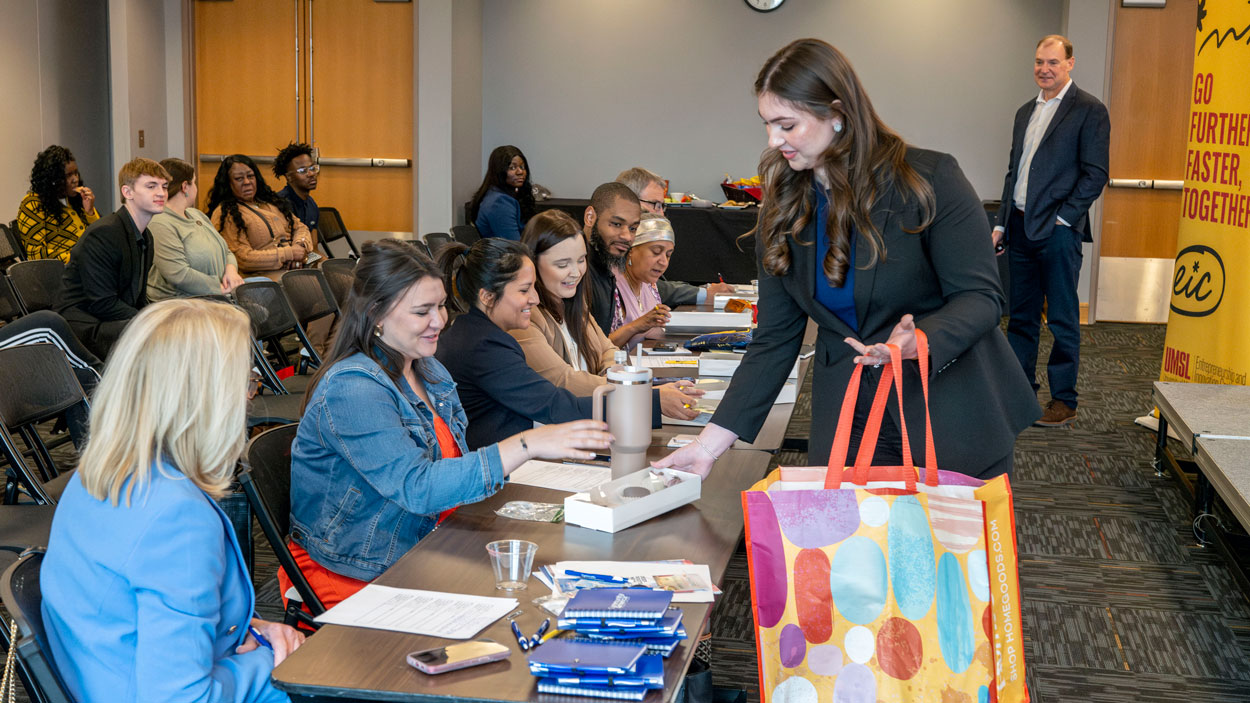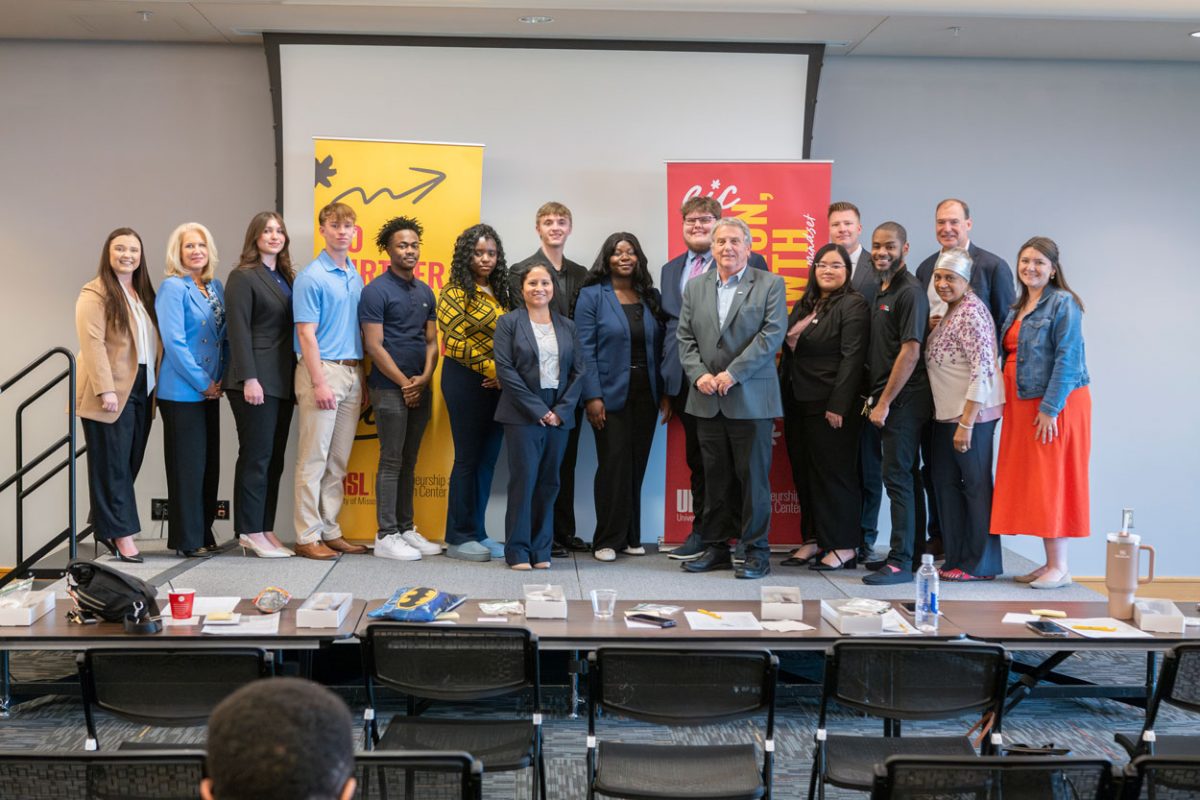
As part of her presentation, Vasilya Kadymova passed out samples of the baked treats she makes with her sisters for their company, Luxury Delights. (Photos by Derik Holtmann)
Speaking after their presentations but before the results of the 2025 Student Pitch Competition had been announced, University of Missouri–St. Louis students George Morrow and Connor Shaw were all smiles, thrilled with the experience of sharing their business ideas in front of a panel of seven judges as part of the Entrepreneurship and Innovation Center event.
“If I had done more of this type of presentation from the time I started my business a few years ago before I came to UMSL, I probably would have been more fluent up there, would have remembered all of my notes and all my statistics instead of having my computer up there with me,” said Shaw, who pitched his business, Glidiator Fitness, LLC. “If I did this more, I would have refined it, and I would have learned to get more comfortable on a stage.”
Morrow was the first student presenter of the event at the Millennium Student Center, explaining his product, Faucet Saver Shims, which he developed when he recognized a need while working with a plumbing company. His strong presentation masked what he admitted was a bit of anxiety.
“I mean,” Morrow said with a smile, “I kind of hate talking in front of other people, so this experience was great for me.”
Turns out, Shaw and Morrow got more out of the competition than just the experience of presenting. The duo tied for second place, each earning $500.
Vasilya Kadymova took home the first prize of $5,000. The company she runs with her sisters, Luxury Delights, has earned an excellent word-of-mouth reputation for making delicious baked treats. As part of her presentation, Kadymova brought samples for the judges and clearly outlined not only the next steps she and her sisters are planning, but how the potential prize money would help them reach their goals.
“Winning this competition is a huge milestone for us,” Kadymova said. “We plan to invest the $5,000 into launching a professional website to streamline the ordering process and improve accessibility for our customers. We’ll also allocate funds toward upgraded equipment for both baking and content creation, which will enhance product quality and our marketing efforts. Additionally, some of the budget will go toward operational costs as we prepare for potential growth in new markets.”
Kadymova said the company has been a true family business, with her sisters Nazira, Leyla, Songul, and Aseya, along with support from her parents, Zenfira and Malik.
“Working with my sisters has been one of the most rewarding aspects of building Luxury Delights,” she said. “Our bond allows for open, honest communication, and we’re constantly pushing each other to grow — both personally and professionally. Whether it’s brainstorming creative ideas or giving constructive feedback, we balance fun with focus. Our collaboration is grounded in trust, and that really shows in the quality of our work and the energy we bring to our business.”

Student presenters gather on stage with the judges and EIC director Scott Morris after the competition.
Four teams tied for third place: Jameicka Jordan, whose company, MeickaJewels, creates bracelets for students; Michael Sherblom, who is developing an app called TimeOff that will allow users to set a schedule to temporarily disable time-wasting apps on their phones; Devontae Hall, whose company, RestoreHomes, has purchased its first home to restore and sell; and the team of Kaine Koehler and Sedny Sorm, whose company, EcoRadiance, is developing a line of sustainable, subscription-based beauty products.
After each presentation, the judges had the opportunity to ask questions.
“This was so impressive,” said judge Kacey Oloteo, the recruiting manager with Swank Motion Pictures. “I really was taken aback by the students that not only have their business plan but are already in the market and already profiting off of it. For example, the winner, Luxury Delights, she clearly is already in the market and is already trying to expand. I was very impressed with not only their concepts, but their plans to scale their businesses. And every single person that presented is obviously going to have a very bright future. I think that’s clear.”
The judging panel included four judges from the St. Louis business community – Oloteo, Kathy O’Neill (CommunityAmerica Credit Union), Courtney Barrow (Bank of America) and Katie Trouton-Alexander (Edward Jones) – plus three faculty/staff members at UMSL: John Palmer, Carloyn Young and Dorian Hall.
“I loved the variety of ideas and how well thought out the proposals were,” said O’Neill, who was with the Federal Reserve Bank of St. Louis for nearly 36 years before taking a role as president of the St. Louis market with CommunityAmerica. “I think UMSL, as one of the state schools, plays a really important role in the community, training and educating students and people who will stay here. So for me, a big part of CommunityAmerica supporting UMSL is really about helping to build St. Louis and build the expertise, build businesses in St. Louis and keeping people here.”
Some of the presenters, such as Kadymova, Jordan and Hall, were pursuing dreams of creating or building something. Others, such as Morrow, Shaw, Sherblom and Nayesha Sullivan, created their product ideas based on their own experiences.
Before he ever thought of creating an app, Sherblom would physically delete the time-wasting apps – especially social media platforms such as Instagram and Facebook – from his phone in the morning, then reinstall them every evening in an attempt to limit his screen time, and it worked. With one of his presentation slides, he showed that he cut his daily screen time from 6 hours and 32 minutes down to 1:49 with his month-long test run.
“I had to cut my screen time,” he said. “I have a full-time job. I’m a student, and I try to exercise. I just couldn’t afford to waste that time anymore. I needed to get out of it. It was almost like a drug addiction; you’re addicted to neurological pathway dopamine from your phone, as is most of America. So getting away from that, you need actual help, a way to help you stop because if you’re allowed to just click it, you’ll click it forever.”
That type of product background resonated with the judges.
“I’m a recruiter, so I work a lot with college students,” Oloteo said. “I was telling one of the other judges that I’ve seen other colleges do pitch programs and competitions, but this is the only one that I’ve discovered where the students are pitching their own business plan. Other schools might bring in a sponsor, and they create the business plan for the sponsor with their pitch. It was very cool to see that the impact here is going directly to the students.”














